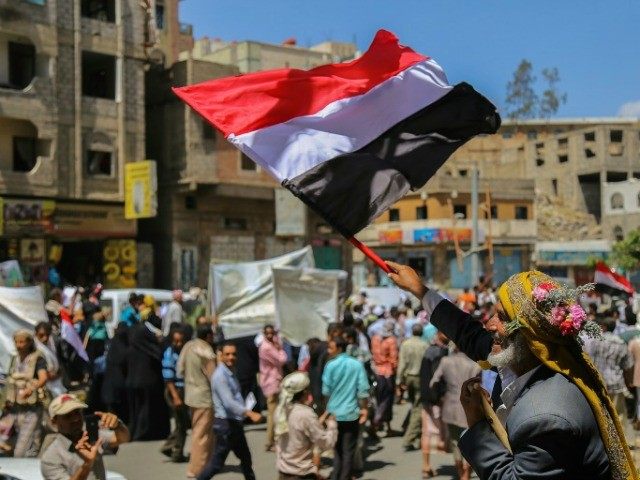Pro-secessionists protesters in southern Yemen, estimated to number in the thousands, are demanding “independence and right to self-determination” amid a fragile ceasefire between warring parties and delayed United Nations-brokered peace negotiations.
A ceasefire between a Saudi-led coalition and Iran-backed Shiite rebels, the Houthis, has held for about a week. It is aimed at laying the foundation for Kuwait-based peace talks that were expected to resume Monday, but were delayed because the rebels failed to show.
For years now, residents of southern Yemen have been protesting in the streets, demanding their right to self-determination. Their efforts have reportedly failed to elicit a response from the international community.
“The southern people demand right of self-determination and other political projects are unacceptable,” reads the pro-secession rallies’ slogan, reports China’s state-run news agency Xinhua.
According to the report:
The Parades Square in Aden’s neighborhood of Khor Maksar and surrounding streets were packed with separation supporters from Yemen’s north amid heavy security measures and deployment of armored vehicles in the area.
The crowds waved flags of what used to be Southern Yemen and hoisted posters of secessionist leaders, shouting slogans such as “We swore never to unite with northerners,” whilst others carried banners.
“Three of my brothers were killed during the war with Houthis who came from northern Yemen to invade Aden last year. … We will keep demanding independence from them until death,” Ali Naif, a student at Aden University, where some of the demonstrations took place, reportedly told Xinhua as tears ran down his face.
In 1990, North and South Yemen were peacefully united into one country until their relationship deteriorated in 1994.
Yemen’s southern region reportedly started calling for separation again in 2007.
“The southerners complained of being marginalized, particularly after loosing [sic] a four-month civil war in 1994,” reports Xinhua.
“Pro-secession protests are rising in the south during a deteriorating economy and discrimination allegations favoring the northerners,” it adds. “Concerns have developed as the conflict in southern Yemen is causing instability, where the Yemen-based al-Qaida offshoot may take over further territories.”
On Monday, representatives of the internationally recognized government, led by Yemeni President Abd Rabbuh Mansur Hadi, were supposed to meet with the Houthis rebels and their allies — armed groups loyal to former President Ali Abdullah Saleh.
However, the Houthi rebel delegation reportedly stayed behind in Yemen, refusing to go to Kuwait to negotiate peace with the Yemeni government delegation led by Foreign Minister Abdulmalek al-Mikhlafi.
“Due to developments over the last few hours, the start of the Yemeni-Yemeni peace negotiations scheduled to begin today … will be delayed,” revealed UN envoy Ismail Ould Cheikh Ahmed in a statement, without specifically saying when they might resume.
“The next few hours are crucial,” he added, urging all parties to “take their responsibilities seriously and agree on comprehensive solutions.”
Meanwhile, the pro-secession Southern Movement, youth activists, and politicians of the former Southern Yemeni state organized the anti-unity protests.
The Yemen-based al-Qaeda in the Arabian Peninsula (AQAP), considered the most dangerous branch of the jihadist group, has capitalized on the unrest in Yemen. It has established a strong presence in southern Yemen, prompting some analysts to say the terrorist group is stronger than ever.

COMMENTS
Please let us know if you're having issues with commenting.